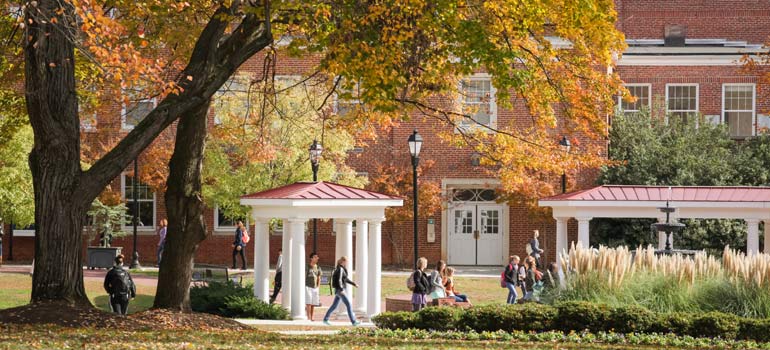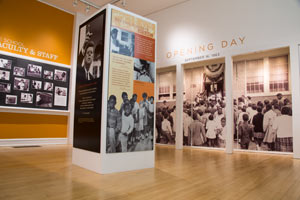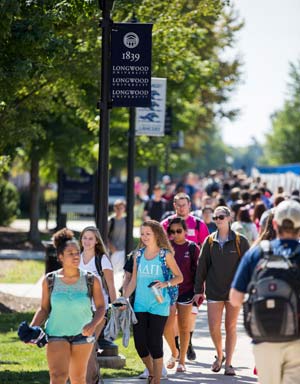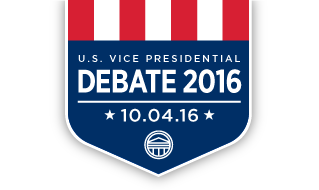The Longwood Story

Founded in 1839, Longwood is among the nation’s hundred oldest institutions of higher learning, and the third-oldest public institution in Virginia, behind William & Mary and the University of Virginia. With an enrollment of approximately 5,100 students, our distinctive mission is to prepare students for a life of citizen-leadership. (For more information, see Longwood Facts and Longwood Overview.)
Longwood’s Campus
Longwood’s historic heart is a 60-acre central campus with distinctive classical red-brick architecture including the iconic Ruffner Hall and its famed Rotunda. The debate itself will take place in Willett Hall, a multi-purpose building on central campus that includes academic and athletic spaces and is home to Longwood’s men’s and women’s basketball teams.
Longwood and Farmville in American History
A backdrop to the Longwood debate is the university’s connection to several pivotal moments in American history. The campus stands at a remarkable historical crossroads, where the Civil War ended and the modern Civil Rights movement began.

R.R. Moton Museum, site of a historic 1951 student strike that became a touchstone moment in the early days of the modern Civil Rights movement, became affiliated with Longwood in 2015.
Some of the final scenes of the Civil War played out on the north end of campus, where Generals Lee and Grant missed each other by just a few hours in April, 1865, just two days before the war ended a few miles to the west at Appomattox. Nearly a century later, the south end of campus was the scene of a critical moment in the modern Civil Rights movement: the courageous strike led by 16-year-old student Barbara Johns against conditions at her segregated Robert Russa Moton High School. Those students eventually became the majority of plaintiffs in the Brown v. Board of Education Supreme Court case, and the struggle for equality of opportunity in education continued through the period of Massive Resistance, with the local public schools closed for five years.
In recent years, Longwood has been at the forefront of efforts to acknowledge this history in teaching and scholarship. Thousands of Longwood students have passed through the Moton Museum, a national historic landmark, and earlier this year, the museum and university finalized an affiliation. They now work formally together in support of the museum’s mission of expanding understanding of civil rights history. (For more information about Longwood and the Moton Museum, see this Washington Post article and this Farmville Herald article.)

There is a common theme to the remarkable history that took place here, from General Grant to the Civil Rights movement to the recent partnership between Moton and Longwood. Our community is a place that has played a visible role in some of the nation’s most difficult struggles, but it is also a place where leadership has been forged in reconciliation. It’s a theme that can carry a powerful message at this juncture in our national politics, and Longwood intends to make it a centerpiece of debate-related activities over the coming year.
Why is Longwood hosting a debate?
With our mission of nurturing citizen-leadership, the opportunity to experience a debate firsthand will be an incomparable opportunity for our students, faculty, staff and alumni. We believe hosting a debate is a natural extension of the work we already do. It is also an unmatchable opportunity to share our story with the world; viewership for the 2012 vice presidential debate exceeded 50 million, with many more around the world.
Additional Media Resources
To request an interview with President Reveley or Longwood students, please contact Matthew McWilliams at mcwilliamsmj@longwood.edu or 434-808-2350 (cell). For a video news release, photos, b-roll, quotes and more, see Media Resources.
Debates on college campuses and in Virginia
Vice presidential debates have an established track record of being set on college and university campuses across the country. Since 1992, five of the last six vice presidential debates have taken place on a college campus, including the last four.
Two Virginia colleges have held national debates: The College of William & Mary hosted the first ever debate on a college campus in 1976 and the University of Richmond hosted the first-ever town-hall style debate in 1992. Both institutes count their debates as major factors that launched them into the national spotlight.
Commission on Presidential Debates
The Commission on Presidential Debates was established in 1987 to ensure that debates provide the best possible information to viewers and listeners. Since 1988, the commission has sponsored and produced all presidential and vice presidential debates. It is also engaged in active research and educational activities relating to the debates. You can find out more about the Commission on Presidential Debates on their website at www.debates.org.


